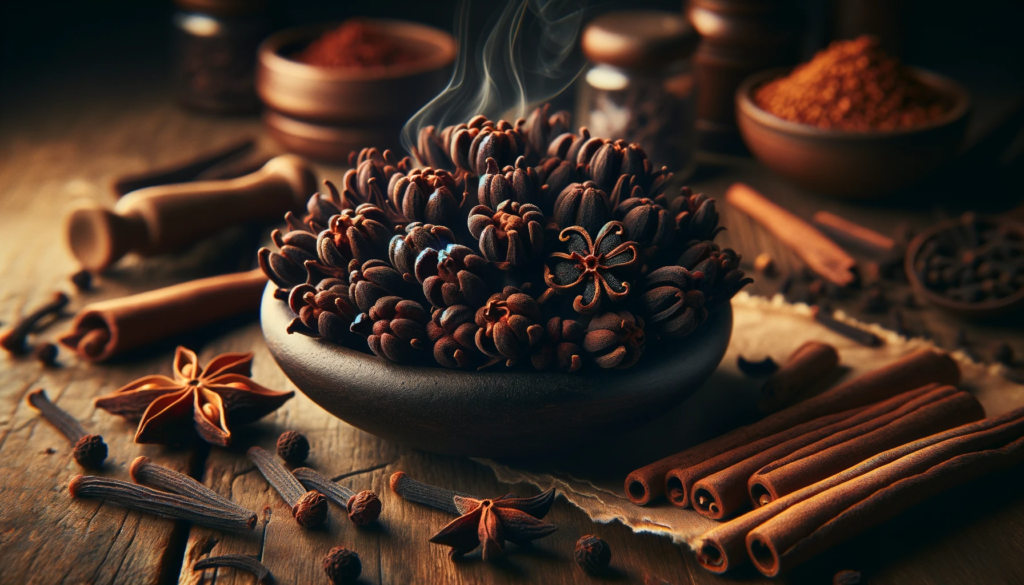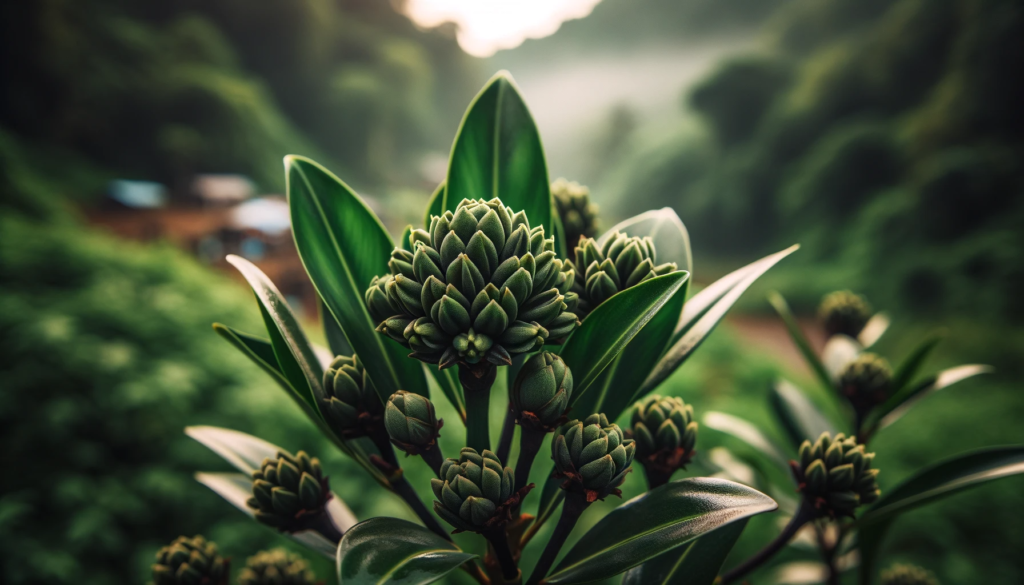Exploring the Essence of Cloves in African Cooking
Cloves: A Profile of Their Strong, Sweet, and Aromatic Flavor
Cloves, known for their intense, sweet, and aromatic flavor, are a distinctive spice in African cuisine. Extracted from the flower buds of the clove tree, they impart a warm, rich taste and fragrance to dishes. This potent spice is often used sparingly due to its strong flavor profile. In African cooking, cloves are used both in whole and ground forms, contributing to the depth and complexity of flavors in spice blends, marinades, and various dishes. Their ability to enhance both sweet and savory dishes makes them an invaluable ingredient in the African kitchen.
The Cultural and Historical Significance of Cloves in Africa
The use of cloves in African cooking is deeply rooted in the continent’s history and culture. Cloves, originally from the Maluku Islands in Indonesia, were brought to Africa through ancient trade routes. They quickly found a place in African culinary traditions, particularly in regions along the coast influenced by trade and cultural exchanges. In addition to their culinary uses, cloves have been valued in Africa for their medicinal properties and as a commodity in the spice trade, playing a significant role in the economic and cultural history of various African regions.
The Art of Using Cloves in African Spice Blends and Marinades
Mastering Spice Blends: The Role of Cloves
Cloves are critical in many African spice blends, contributing a bold and aromatic character. In spice mixes like Ras el Hanout from North Africa or Berbere from Ethiopia, cloves are blended with other spices to create a complex and harmonious flavor profile. These spice blends are used in various dishes, from stews and curries to rice and meat preparations, adding layers of flavor that define many African cuisines. Skilfully balancing cloves with other spices is key to achieving the desired flavor without overpowering the dish.
Crafting Flavorful Marinades with Cloves
In addition to spice blends, cloves are often used in marinades to impart a deep, aromatic flavor to meats and vegetables. Whether used whole in slow-cooked dishes or ground in marinades, cloves infuse the food with a warm, rich flavor, enhancing the natural taste of the ingredients. They work particularly well with grilled meats and roasted vegetables, where their strong flavor complements the smokiness and char. The use of cloves in marinades is a testament to their versatility and the creativity of African cooking techniques.

Cooking Techniques and Tips for Using Cloves
Best Practices for Selecting and Storing Cloves
When selecting cloves, look for whole cloves that are plump and oily, which indicate freshness and a high essential oil content. These will have a stronger flavor compared to dried-out ones. Whole cloves can be stored in an airtight container in a cool, dark place, where they can retain their potency for about a year. Ground cloves, while convenient, lose their potency faster and are best used within a few months. Keeping cloves away from direct sunlight and moisture will ensure they maintain their distinct aromatic qualities.
Culinary Tips for Maximizing the Flavor of Cloves
To maximize the flavor of cloves in cooking, consider grinding them fresh from whole cloves. This releases their aromatic oils and ensures a more potent flavor. Cloves are powerful, so a little goes a long way. They can be used whole, especially in slow-cooked dishes where they infuse their flavor gradually, or ground, for a more immediate impact. In both sweet and savory dishes, cloves pair well with cinnamon, nutmeg, and ginger, creating a warm and complex flavor profile. Be mindful of the quantity used, as the strong flavor of cloves can easily dominate a dish.
Regional Variations: Cloves in Different African Cuisines
Cloves in North African Cooking
In North African cuisine, cloves are integral to many traditional dishes, imparting a warm, spicy essence. They are often used in tagines, stews, and couscous dishes, complementing meats and vegetables with their intense flavor. Cloves also play a significant role in North African spice blends, such as Ras el Hanout, contributing to the blend’s depth and aroma. The spice is used judiciously in sweet pastries and desserts, where its pungency balances the sweetness and adds an aromatic complexity.
The Use of Cloves in East and West African Dishes
In East and West African cuisines, cloves add depth to various dishes. In East Africa, they are often found in spice mixes for curries and rice dishes, enhancing the flavors with their bold aroma. In West African cooking, cloves are used in soups, sauces, and marinades, particularly in dishes that feature a combination of spices. Their inclusion in traditional and modern recipes demonstrates the spice’s adaptability and the innovative spirit of African culinary practices.

Innovative Recipes: Clove-Infused African Dishes
Traditional African Recipes Enhanced with Cloves
Discover traditional African dishes brought to life with the addition of cloves. A Clove-Infused Moroccan Lamb Tagine, where the spice adds depth and warmth, provides a new twist on a beloved classic. For a side dish, try Clove-Spiced Jollof Rice, a popular West African dish where cloves lend a subtle yet distinctive flavor. In desserts, a Clove and Citrus North African Cake offers a delightful blend of sweet and spicy, showcasing cloves’ versatility in sweet applications.
Modern African Fusion Recipes Featuring Cloves
Embrace the fusion of traditional and contemporary with modern African recipes featuring cloves. Experiment with a Clove and Cinnamon-Spiced Beef Stew, blending rich flavors for a comforting meal. In the realm of desserts, a Clove-Infused Malva Pudding brings a warm, aromatic twist to this South African favorite. Cloves can also be a star in beverages, such as a Spiced Clove and Coffee Brew, marrying African coffee traditions with the distinct flavor of cloves.
Cloves in African Cuisine: FAQs
1. How Should Cloves Be Used in Cooking?
Cloves should be used sparingly due to their strong flavor. They can be added whole in slow-cooked dishes or ground for a more immediate impact. Cloves pair well with both savory and sweet dishes, enhancing flavors without overwhelming them.
2. Can Cloves Be Used in Both Sweet and Savory Dishes?
Yes, cloves are versatile and can be used in sweet and savory dishes. They add depth to stews and meats in savory dishes and warming spice to desserts and baked goods.
3. What Are the Health Benefits of Cloves?
Cloves are known for their medicinal properties, including aiding in digestion, having antiseptic qualities, and providing relief from respiratory ailments. They are also rich in antioxidants and can contribute to overall wellness when used as a balanced diet.
4. How Long Can Cloves Be Stored?
Whole cloves, when stored properly in a cool, dry place away from light, can last up to a year or more while retaining their potency. Ground cloves should be used more quickly, ideally within a few months, as they lose their flavor faster.
5. Can You Grind Whole Cloves at Home?
Yes, you can grind whole cloves at home using a spice grinder or a mortar and pestle. Grinding cloves just before use ensures maximum freshness and flavor in your dishes.
6. Are Cloves Used in Any African Beverages?
Yes, cloves are sometimes used in African beverages. They can be found in spiced teas and coffees, adding a warm, aromatic quality to these drinks. In some regions, cloves are also used in traditional herbal brews for their flavor and health benefits.
7. What Is the Best Way to Cook with Cloves in Savory Dishes?
In savory dishes, cloves are best used as part of a spice blend or infused into cooking liquids to impart their flavor subtly. They pair well with meat, particularly in slow-cooked stews or roasts, where their flavor can develop and meld with other ingredients.
